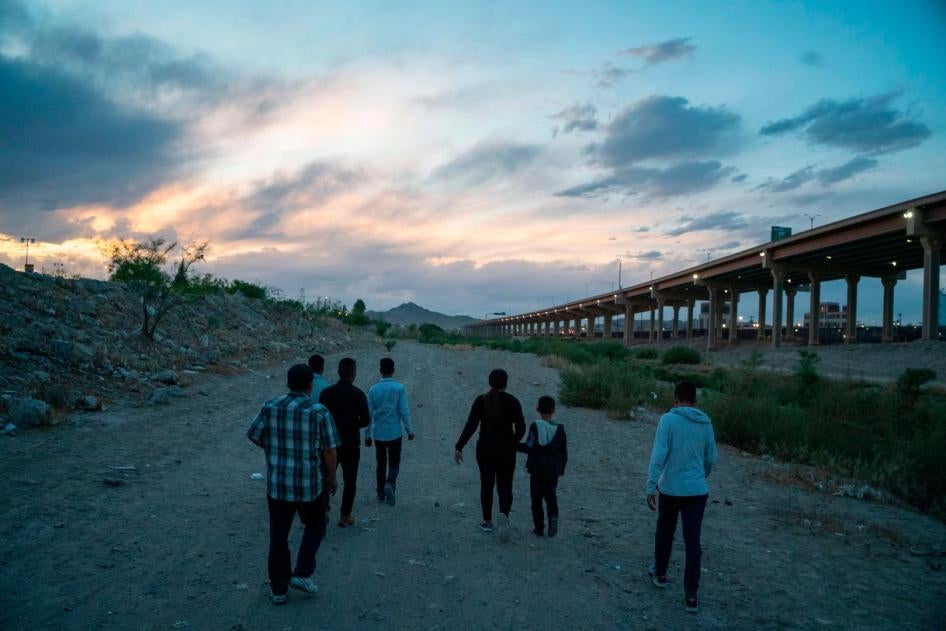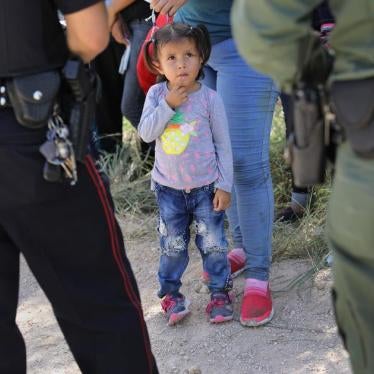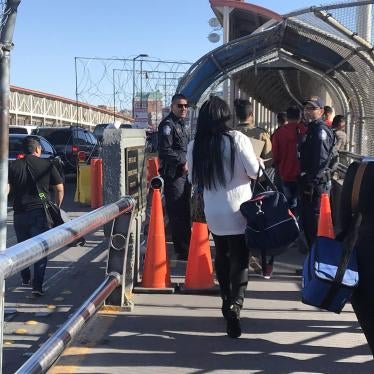Chairman Thompson, Chairwoman Rice, Ranking Member Rogers, Ranking Member Higgins and distinguished Members of the Border Security, Facilitation and Operations Subcommittee, thank you for the opportunity to submit a written statement into the record for today’s hearing, “Examining the Human Rights and Legal Implications of DHS’ ‘Remain in Mexico’ Policy.”
Human Rights Watch is a non-profit, independent organization that investigates allegations of human rights violations in more than 90 countries around the world, including the United States. We document human rights violations, issue detailed reports, and advocate for changes in law, policy, and practice to address the harms.
In July 2019, Human Rights Watch released a report entitled, “We Can’t Help You Here”: US Returns of Asylum Seekers to Mexico, on the Migrant Protection Protocols (“MPP”) program.[1] In September and October 2019, we released updates on the escalating abuses of the program.[2] As part of our investigations into the human rights impact of this program, we have interviewed dozens of asylum seekers in Ciudad Juarez, Matamoros, and Reynosa, Mexico, as well as Mexican officials, US attorneys, US immigration court workers, advocates, and others. We have heard firsthand the testimonies of people who have described being kidnapped, raped, and assaulted; families with children who lack adequate shelter; and asylum seekers who face high if not insurmountable barriers receiving due process on their asylum claims.
Since the start of the MPP program in January 2019, over 55,000 asylum seekers, including at least 16,000 children, have been returned to Mexico. Customs and Border Protection (“CBP”) continues to return asylum seekers with disabilities or other chronic health conditions to Mexico, despite the Department of Homeland Security’s initial guidance that no one with “known physical/mental health issues” would be placed in the program. In Ciudad Juárez, Human Rights Watch documented six such cases, four of them children, in August and September alone. Human Rights Watch has also found that the Mexican government does not have a proper system in place there to screen and identify asylum seekers with disabilities and chronic health conditions. The authorities have not ensured physical accessibility in shelters, even new ones. Nor are they consistently providing information about and access to health care for asylum seekers with disabilities or chronic health conditions.
A program that was initially limited to Tijuana and Mexicali now includes Ciudad Juarez, Matamoros, Reynosa, and Nuevo Laredo, some of the most dangerous cities in Mexico. Matamoros, Reynosa, and Nuevo Laredo are in the state of Tamaulipas, for which the US State Department Travel Advisory is “Do Not Travel,” the same as for Afghanistan and Syria.
The inherently inhumane ‘Remain in Mexico’ program is getting more abusive by the day. The program’s rapid growth in recent months has put even more individuals and families in danger in Mexico while they await an increasingly unfair legal process in the US.
Asylum Seekers Stranded with No Means to Survive
Asylum seekers who spoke to Human Rights Watch expressed fear and confusion at the prospect of being made to wait in a city where they did not have social ties, legal authorization to work, and access to shelter, since the number of asylum seekers in the city already far exceeded available free shelter space.
In the MPP program, those who can’t afford to pay for a hotel room or private residence sleep on the streets or stay in churches or abandoned homes. Most asylum seekers fleeing Central America have extremely limited means and often cannot pay for shelter, food, water, or other necessities. In particular, in Matamoros, Mexico, as many as 1,500 migrants are living in a tent encampment near the Brownsville port of entry amid deteriorating medical and sanitary conditions.[3] If these asylum seekers were pursuing their cases in the US, they would more likely be able to access support to sustain themselves while their claims are pending through personal networks. Although asylum seekers are not legally eligible to apply for work in the US until their cases have been won or 150 days have passed, nearly 84 percent of the asylum seekers in the MPP program reported having relatives in the US, according to the Mexican government.
Returned Asylum Seekers Facing Physical Violence, Threats
The precarious existence of asylum seekers and their identity as non-Mexicans in northern Mexico increases their vulnerability to physical harm.
According to the Mexican government, the country is currently facing a violent public security crisis. Mexico recorded more intentional homicides in 2018 than it has since the country began keeping records in 1997, and three of the states to which asylum seekers are being returned under MPP, Baja California, Chihuahua, and Tamaulipas, are among the most violent in the country.
Among those asylum seekers Human Rights Watch interviewed, several reported attacks on themselves or others, including kidnapping, sexual violence, and other violent assaults. For example:
- Delfina M. (pseudonym), 20, an asylum seeker who fled Guatemala with her 4-year-old son, said that after she was returned to Ciudad Juárez, two men grabbed her in the street and sexually assaulted her, which her son witnessed. They told her not to scream and threatened to kill her son. “I can still feel the dirtiness of what they did in my body,” she said.
- Rodrigo S. (pseudonym), 21, who fled El Salvador, told a judge in immigration court proceedings that he was robbed at knifepoint and stabbed in the back. He said he went to the police, but the Mexican officers wouldn’t help him because he wasn’t a Mexican citizen. He told the judge that although he is recovering physically, he’s afraid to be sent back.
- Esteban G. (pseudonym), 19, said in immigration court he was robbed when he left his room to go to the store for food. He told police he suspected a neighbor of stealing his cellphone. When police investigated the neighbor, they recovered his cellphone, but after that, the neighbor's family threatened to hurt him.
- Kimberlyn, a 23-year-old Honduran, told Human Rights Watch she had been kidnapped by a taxi driver along with her 5-year-old daughter upon returning to Ciudad Juárez after her first court hearing in the US in April. The driver released them within hours but said he would kill them if her family did not pay a ransom. She showed Human Rights Watch deposit receipts for $800 in payments made by relatives in Honduras.
Human Rights Watch additionally spoke with two asylum seeker mothers with small children who said they were kidnapped in Nuevo Laredo in early October on their way to present themselves at the Laredo port of entry for a court hearing. Upon their release, the kidnappers told them they had to leave town or die. They consequently missed their court hearing in Laredo and were likely ordered removed in absentia. The Mexico City-based Institute for Women in Migration has documented 212 kidnappings of migrants in the state of Tamaulipas from mid-July through October 15 with 197 occurring in Nuevo Laredo.[4]
Despite these risks, the program’s “nonrefoulement” screening process administered by US Citizenship and Immigration Services asylum officers to determine whether a migrant faces harm in Mexico has come under criticism from US officials involved in administering interviews or who have reviewed the process.[5] According to Buzzfeed News, a team of senior Department of Homeland Security (“DHS”) officials who examined the Remain in Mexico program found that asylum officers face pressure in at least some locations along the border to “arrive at negative outcomes when interviewing migrants on their claim of fear of persecution or torture.”[6]
Severely Limited Access to Attorneys, Chaotic, Closed Court Hearings
Meanwhile, asylum seekers forced to remain in Mexico have no meaningful due process. Immigration attorneys and advocates in the United States indicate the need for legal services for returned asylum seekers in Mexico is overwhelming and that attorneys working to provide low-cost or free representation face serious barriers to providing that representation, including returned asylum seekers’ lack of fixed addresses and telephone numbers. According to the Transactional Records Access Clearinghouse at Syracuse University, a research center that examined US immigration court records through September 2019, only two percent of returnees have legal representation.[7]
In recent months, the US government has raised new barriers to obtaining representation and accessing counsel and the immigration courts are increasingly closed to the public. During the week of September 9, the Trump administration began conducting hearings for asylum seekers returned to Mexico in makeshift tent courts in Laredo and Brownsville, where judges are expected to preside via videoconference. Citing “heightened security measures” since the courts are located near the border, DHS has denied attorneys without a signed representation agreement, as well as journalists, entry to these port-of-entry courts.[8] Obtaining a signed representation agreement outside of court for attorneys seeking to represent clients who are part of the Remain in Mexico program implies difficult and potentially dangerous travel to Mexico.
***
The US should immediately cease returning asylum seekers to Mexico and instead ensure them access to humanitarian support, safety, and due process in asylum proceedings here in the United States. Congress should urgently act to prohibit using government funds to continue this program. The US should manage asylum-seeker arrivals through a genuine humanitarian response that includes a fair determination of an asylum seeker’s protection claim in a safe and dignified environment that enables that person to seek legal and social support while their claim is pending so they will not be forced to abandon their claims for protection because of fear or destitution.
[1] Human Rights Watch, “We Can’t Help You Here:” US Returns of Asylum Seekers to Mexico, July 2, 2019, https://www.hrw.org/report/2019/07/02/we-cant-help-you-here/us-returns-asylum-seekers-mexico.
[2] Human Rights Watch, “Mexico: Risks at Border for Those With Disabilities,” October 29, 2019, https://www.hrw.org/news/2019/10/29/mexico-risks-border-those-disabilities; Human Rights Watch, “US Move Puts More Asylum Seekers at Risk,” September 25, 2019, https://www.hrw.org/news/2019/09/25/us-move-puts-more-asylum-seekers-risk.
[3] Nomaan Merchant, Tents, stench, smoke: Health risks are gripping migrant camp, The Associated Press, November 14, 2019, https://apnews.com/337b139ed4fa4d208b93d491364e04da.
[4] Maria Verza, Migrants thrust by US officials into the arms of the cartels, November 15, 2019, https://www.washingtonpost.com/world/the_americas/migrants-thrust-by-us-officials-into-the-arms-of-the-cartels/2019/11/15/84770670-07e5-11ea-ae28-7d1898012861_story.html.
[5] Greg Sargent, In scathing manifesto, an asylum officer blasts Trump’s cruelty to migrants, The Washington Post, November 12, 2019, https://www.washingtonpost.com/opinions/2019/11/12/scathing-manifesto-an-asylum-officer-blasts-trumps-cruelty-migrants/.
[6] Hamed Aleaziz, US Border Officials Pressured Asylum Officers To Deny Entry To Immigrants Seeking Protection, A Report Finds, BuzzFeed News, November 14, 2019, https://www.buzzfeednews.com/article/hamedaleaziz/dhs-asylum-report-mpp-immigration-remain-mexico
[7] TRAC Immigration, Access to Attorneys Difficult for Those Required to Remain In Mexico, https://trac.syr.edu/immigration/reports/568/.
[8] Bianca Seward, Mariana Atencio and Daniella Silva, Tent court hearings for migrants ramp up in Texas as lawyers decry lack of access, NBC News, September 16, 2019, nbcnews.com/news/latino/tent-court-hearings-migrants-ramp-texas-lawyers-decry-lack-access-n1054991.









